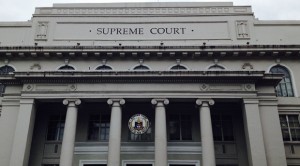MANILA, Philippines—The Supreme Court has allowed the Bureau of Internal Revenue (BIR) to obtain copies of the statements of assets, liabilities and net worth (SALNs) of justices of the antigraft court Sandiganbayan.
In an en banc resolution dated Nov. 18 and released by deputy clerk of court Felipa Anama, the tribunal partly granted the request of Immigration Commissioner Kim Henares for the SALNs of the Sandiganbayan magistrates.
“The court resolved to partially grant the request of Commissioner Henares for certified copies of the SALNs of all incumbent Sandiganbayan justices for the last three years only,” the resolution stated.
The SALNs to be given shall cover the years 2011, 2012 and 2013.
The resolution also noted the letter of Sandiganbayan presiding Justice Amparo Cabotaje-Tang stating that the antigraft court was leaving it up to the Supreme Court the decision on whether to grant Henares’ request.
Last August, the Supreme Court denied the request of the BIR to obtain copies of the SALNs of the justices of the high court, the Court of Appeals and the Court of Tax Appeals “for lack of reasonable and sufficient basis.”
The high court said Henares failed to identify the particular persons she sought to investigate, and that she had not given notice to those supposedly being investigated that they were being accused of fraud.
The high court also found it “curious” that while Henares claimed that her interest was to ensure tax compliance by the members of the judiciary, she showed no interest to seek the SALNs of the other members of the judiciary like those in the Sandiganbayan or the first level courts.
In the request made by Henares to the Supreme Court last March 2014, she said the reason in procuring the SALN of the justices was “for tax investigation purposes pursuant to Section 5B of the National Internal Revenue Code of 1997 in relation to the Ma’am Arlene controversy in the judiciary.”
“Ma’am Arlene” has been identified as an influential fixer in court circles.
The high court said Henares’ reason was “dangerous” and could subject the magistrates to harassment, adding that the “Ma’am Arlene controversy”—which pertained to allegations of bribery, influence-peddling and case-fixing in the judiciary—was still undergoing investigation.
